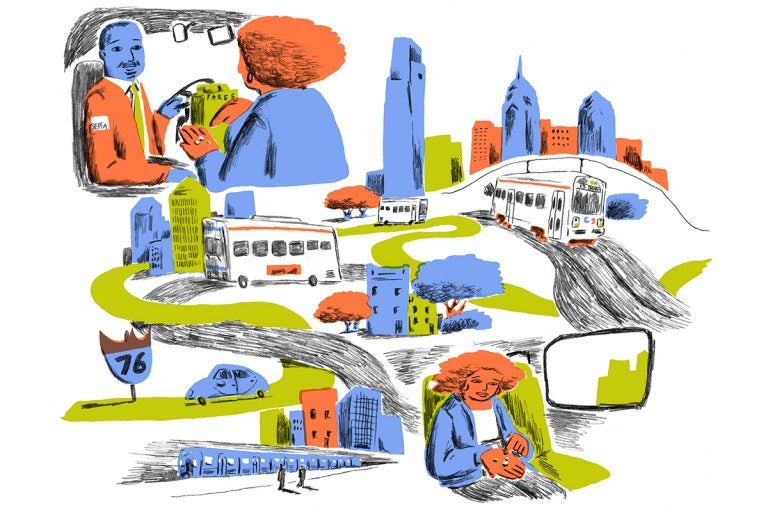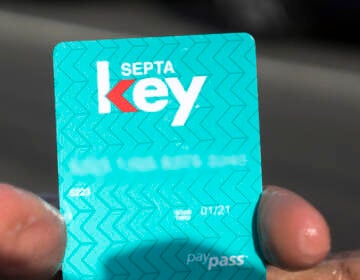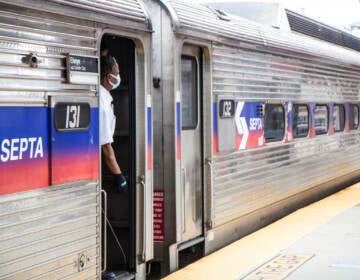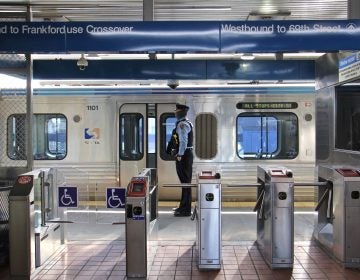The high cost of being broke: Transportation

(Steve Teare for Broke In Philly/WHYY)
On the 11th floor of a Center City office building, Rian Franks and Jacqueline Chapman sit just a few feet away from each other.
Both travel from West Philadelphia. But the distance between these co-workers widens quickly when they talk about what it’s like trying to pay for their commutes.
For Chapman, an unemployed mother living in deep poverty, it’s tough every month.
For Franks, a mother with a salary that puts her above the official poverty line, it’s doable if she’s really careful and no curveballs come her way.
“There’s not a lot of extra money,” said Franks. “I was lucky to have a family that taught me how to be a thrifty shopper, find the sales.”
Chapman is a volunteer receptionist at the Philadelphia Unemployment Project, a nonprofit that helps people find work and stay in their homes when they’re facing foreclosure.
Three days a week, she dips into her dwindling stash of SEPTA tokens and hops on a trolley, then the bus before reaching PUP’s cramped office on North Broad Street near City Hall.
Chapman gets a small stipend, just north of $20, after each shift. It’s enough to buy lunch, get home and maybe put something towards the rent or food for the house.
“The other two days, I’m home because I don’t have carfare,” she said.
Chapman has been unemployed for two years. But even when she’s had steady work, paying to get around the city was somewhere between hard and nearly impossible.
She and her teenage son earn less than $8,000 a year, the federal government’s definition of “deep poverty” for a two-person family.
When Chapman was a part-time classroom assistant with the School District of Philadelphia, for example, she brought home less than $150 every two weeks.
At nearly $30, her weekly SEPTA Transpass ate up almost half of each paycheck. On more than one occasion, she had to borrow money to put food on the table.
“Sometimes it was very frustrating to the point where I wanted to quit at one point. But if I quit, what the consequences would be, so I would continue to push on,” said Chapman.
To get by, Chapman relies on the Supplemental Nutrition Assistance Program, or SNAP, most commonly referred to as food stamps. Her rent is also heavily subsidized thanks for a low-income housing voucher through the Philadelphia Housing Authority.
Because her only income right now is from PUP, Chapman pays roughly $50 a month for the two-bedroom apartment she shares with her 18-year-old son, who is also unemployed. He kicks in what he can, when he can, from selling body oils, sneakers and purses from a street kiosk near 52nd and Market Street, though competition is stiff.
Some days he walks away having earned nothing.
“It’s a struggle, but we’re making it,” said Chapman.
Franks can relate.
Six years ago, she was a student at Arcadia University working on a public policy degree, while also working a minimum wage retail job at the King of Prussia Mall.
She took home $300 each week. After laying out for public transportation, rent, food, and bills, she was completely tapped out until the next paycheck.
“I was very upset because I would work, and work, and work, and wouldn’t be able to enjoy anything,” she said.
These days, Franks is the lead housing counselor at PUP. There’s more financial breathing room. And yet, her monthly budget can quickly become a frustrating jigsaw puzzle.
“I have to be extremely careful to follow my advice that I give my clients at work. And that is: you have to really, really budget ahead,” said Franks before work recently. “If I don’t budget and plan for weekly transportation, it can get very, very sticky for me.”
Like Chapman, she relies on SEPTA to get to PUP. She has a car, but there’s not a lot of long-term street parking near her job, and she can’t afford to get a ticket. Paying to park in a garage every day is too expensive — out of the question.
So, Franks buys four weekly Transpasses each month (she doesn’t have enough money at once to buy a monthly pass) and pays for car insurance.
Buying the weekly passes means she spends $5 more a month than if she could afford a monthly.
Rent and transportation eat up about half of her monthly pay. After laying out for bills, including student loans, and food, Franks usually has about $200 leftover before it’s time for the next round of Transpasses.
Even though she has a better job, Franks said she still finds herself choosing between transportation and fun. Even buying lipstick or a book can be difficult depending on the month.
“When you’re already struggling to make ends meet and you’ve already sacrificed it’s another, ‘oh crap, I can’t do anything now’ because I gotta give SEPTA my money,'” said Franks.
—
 WHYY is one of 19 news organizations producing Broke in Philly, a collaborative reporting project on solutions to poverty and the city’s push towards economic justice. Follow us at @BrokeInPhilly
WHYY is one of 19 news organizations producing Broke in Philly, a collaborative reporting project on solutions to poverty and the city’s push towards economic justice. Follow us at @BrokeInPhilly
WHYY is your source for fact-based, in-depth journalism and information. As a nonprofit organization, we rely on financial support from readers like you. Please give today.







